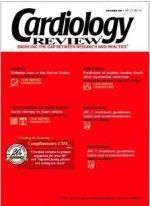Statins extend survival in heart failure
TORONTO—Therapy with HMG-CoA reductase inhibitor drugs (statins) improves survival in patients with heart failure (HF) regardless of the etiology of the HF, according to two studies presented at the 8th Annual Scientific Meeting of the Heart Failure Society of America.
Retrospective data from the University of California, Los Angeles (UCLA) show an improvement in survival among patients with systolic HF who took statins compared with those who did not take statins, and the favorable effect of statins was observed in patients with either low or high total cholesterol levels, said Tamara Horwich, MD, cardiology fellow at UCLA, and lead investigator of the study.
Horwich and colleagues analyzed data on 473 patients with systolic HF of multiple etiologies who were evaluated at their clinic. Total cholesterol levels were measured at the time of initial referral. Statin therapy was defined as a statin begun prior to referral or started within 3 months of referral and continued throughout the study period.
Fifty-four percent of the patients were treated with a statin. Those on a statin were more likely to have coronary artery disease, hypertension, and diabetes.
In the total cohort, 1-year survival was 81% among the patients taking a statin compared with 67% for those not taking a statin. When adjusted for other variables, patients with total cholesterol of 162 mg/dL or less who were on a statin had a 48% reduction in mortality risk, and those with total cholesterol greater than 162 mg/dL who were on a statin had a 76% reduced risk.
Lower total cholesterol levels have been associated with impaired HF survival in previous studies, noted Dr. Horwich. “Even in low cholesterol, we saw continued advantage with a statin,” she said. “In our clinic, we have been using statins in HF of ischemic etiology.”
Nonlipid-lowering effects may explain the benefit in HF. Some of the potential mechanisms are inhibition of cardiac hypertrophy and remodeling, improvement of autonomic nervous system function, increased endothelial nitric oxide, improved endothelial function, and anti-inflammatory effects. Animal studies show improvements in left ventricular ejection fraction of 5% to 10% with simvastatin, she said.
In a second retrospective analysis presented here, higher cholesterol levels were associated with improved survival in patients with chronic HF, but only in those taking a statin, said Gad Cotter, MD.
Cotter and co-investigators from Assaf-Harofeh Medical Center in Israel analyzed 807 patients from the placebo arm of a study designed to assess the efficacy of an endothelin antagonist in chronic HF. To be eligible, patients had to have New York Heart Association Functional Class IIIb-IV chronic HF despite optimal medical therapy, an ejection fraction less than 35%, and either hospitalization for HF in the previous 12 months or the ability to walk less than a 375-meter distance on the 6-minute walk test. Fifty-six percent of the patients received statins.
Having a cholesterol level above the median (193 mg/dL) was associated with decreased mortality, although this association became weaker as follow-up progressed to 130 weeks after study randomization. The survival benefit associated with higher baseline cholesterol was observed only in the patients taking statins, however. Statin treatment was associated with a 67% reduction in the risk of all-cause mortality (P < .001), and the risk reduction with statins became stronger over time, but statin treatment was paradoxically not correlated with readmission for HF, said Dr. Cotter, who is now an associate professor of medicine at Duke University in Durham, North Carolina.
Unlike the UCLA study, the effect of statins was more pronounced in patients with higher baseline cholesterol levels. In patients not receiving statin therapy, baseline cholesterol level had no effect on mortality. The beneficial effect of statins on outcome was equal in patients with HF of ischemic or nonischemic origin, he said.
“One of the problems is that there is no prospective, randomized study yet looking at statins in HF, and we’re awaiting the results of
the CORONA [Controlled Rosuvastatin Multinational Trial in Heart Failure] study to give us the definitive answer to this question,” said Dr. Cotter.
CORONA is a 3-year, randomized, double-blind study comparing the effects of rosuvastatin, 10 mg daily, with placebo in about 5,000 patients with chronic symptomatic systolic HF of ischemic etiology on the end points of overall survival and cardiovascular morbidity and mortality. Until the results of CORONA are known, Dr. Cotter said that he uses statin treatment in chronic HF patients with high cholesterol regardless of HF etiology.
